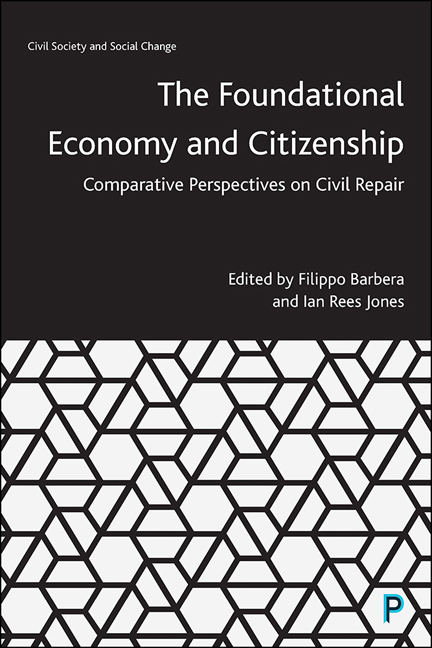Book contents
- Frontmatter
- Contents
- List of Figures and Tables
- Notes on the Editors and Contributors
- Acknowledgements
- Introduction
- 1 The Foundational Economy and the Civil Sphere
- PART I Governance and Public Action
- PART II Housing and Urban Life
- PART III Water and Waste
- PART IV Food
- Conclusions and new policy directions
- Index
6 - Housing and the Grounded City: Rent Extraction and Social Innovations
Published online by Cambridge University Press: 12 March 2021
- Frontmatter
- Contents
- List of Figures and Tables
- Notes on the Editors and Contributors
- Acknowledgements
- Introduction
- 1 The Foundational Economy and the Civil Sphere
- PART I Governance and Public Action
- PART II Housing and Urban Life
- PART III Water and Waste
- PART IV Food
- Conclusions and new policy directions
- Index
Summary
Introduction
After being one of the main political issues in the nascent post-Second World War welfare states, housing has become a neglected topic, both for politics and for social sciences. Only partially included in the field of welfare – Cole and Furbey talked of the ‘amputation’ of the housing arm of the welfare state (1994: 2) – it is mostly perceived as a segment of the market. Only residual attention is currently devoted to the decline of public housing provision, and to the financialization of housing. The role of civil society in housing has changed correspondingly, so that the history of housing and the use of land for its provision can even be interpreted as a history of the transformation of citizenship, understood in a dual sense: citizenship as status, or as a set of rights and duties attributed to the members of a political community; and citizenship as a practice, as a sphere of action that citizens engage in. Like most foundational economic activities, the public provision of housing arose as part of a capitalist economy that necessarily had to grant decent living conditions for workers and citizens in large cities, also including other foundational infrastructure such as sewerage networks and pipelines and public lighting. Over time, however, housing has also become the object of political confrontation, of a politically organized class struggle that followed a periodization based on alternative events in European political history.
In accordance with a vast European sociological literature on housing (see, for example, Power, 1993; Aalbers, 2008; Santos Ana et al, 2015), three epochs can be distinguished, starting from the second postwar period: an era of embedded liberalism (or the era of Fordist compromise); a neoliberal era (also referred to as post-Fordist); and a post-crisis period. One of the most important features of the first phase was the strong politicization of housing problems and the force of claims regarding the right to housing. Crucially, at this stage, the very use of urban land as a source of unearned income was questioned. The neoliberal era was, on the contrary, one of the depoliticization of housing, during which the use of urban land was rather a field of action for strongly legitimized financial actors rather than an object of political engagement (Flinders and Wood, 2015).
- Type
- Chapter
- Information
- The Foundational Economy and CitizenshipComparative Perspectives on Civil Repair, pp. 129 - 156Publisher: Bristol University PressPrint publication year: 2020



